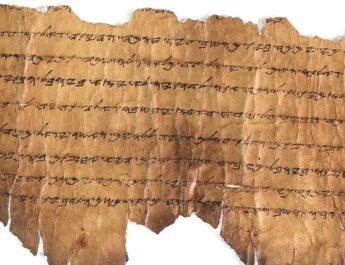Isaiah 49:1-7
Second Sunday after Epiphany A
1 ListenI to me, O coastlands,II
pay attention,III you peoplesIV from far away!V
I “listen” = shama. This is to hear, call, consent, or consider. It implies listening intelligently, giving attention, and, because of these two factors, obedience and action are often implied.
II “coastlands” = i. Perhaps from avah (to desire, crave, wish for, lust after). This is coastland, island, or region. It is a desirable place to live – dry land, coast.
III “pay attention” = qashab. To listen, pay attention to, incline – used in the phrase incline the ears.
IV “peoples” = leom. Root may refer to gathering. This is people, a community, or a nation.
V “far away” = rachoq. From rachaq (to widen, become distant, cast, or remove in a literal or figurative sense). This is distant or far, whether of space or of time.
The LordVI calledVII me before I was born,VIII
VI “Lord” = YHVH. From havah (to be, become) or hayah (to come to pass, become, be). This is the name of the God of Israel, the self-existent and eternal one, the tetragrammaton. This pronunciation has been lost to time so “Lord” is generally used in its place.
VII “called” = qara. This is to call or call out – to call someone by name. Also used more broadly for calling forth.
VIII “born” = beten. Root may mean to be hollow. This is the belly or womb. It can also refer to a body more broadly.
while I was in my mother’sIX wombX he namedXI me.
IX “mother’s” = em. This is a mother as binding a family together or a breeding female animal. It could be mother in a literal or figurative sense.
X “womb” = meeh. This is inward parts, belly, heart, womb, intestines, vastness. It can also be figurative for sympathy.
XI “named” = zakar + shem. Literally, “remembered my name.” Zakar is to remember, to mark something so that it can be recalled, to be mindful of, to mention. Shem may be from sum (to put, place, set). This is name, fame, renown. A name was thought to indicate something essential about a person – something about their individuality. So, this word can also mean honor, authority, or character.
2 He madeXII my mouthXIII like a sharpXIV sword,XV
XII “made” = sum. Related to “named” in v1. See note XI above.
XIII “mouth” = peh. This is mouth in a literal or figurative sense. So, more literally, it can be beak or jaws. More figuratively, it refers to speech, commands, or promises.
XIV “sharp” = chad. 4x in OT. From achad (to go in a direction, unify, gather one’s thoughts); from the same as chadad (to be sharp, fierce). This is sharp. Each time referring to a sword.
XV “sword” = chereb. From charab (to attack, slay). This is any sharp instrument like a sword, dagger, axe, or mattock.
in the shadowXVI of his handXVII he hidXVIII me;
XVI “shadow” = tsel. From tsalal (to be or become dark, shade; this is the shade as during twilight or shadow as associated with something opaque). This is shade in a literal or figurative sense. So, it could be shadow, shade, protection, shelter, or defense.
XVII “hand” = yad. This is hand, ability, power. Hand in a literal sense, but also what one can do or the means by which one does it.
XVIII “hid” = chaba. This is to hide, hush, harden (like water freezing), or secret.
he made me a polishedXIX arrow,XX
in his quiverXXI he hidXXII me away.
XIX “polished” = barar. 18x in OT. To clarify, brighten, or polish. This can mean examine, select, choose. It can also mean purge, sharpen, or purify.
XX “arrow” = chets. From chatsats (to divide, chop, pierce, distribute, shoot an arrow, an archer). This is an arrow or archer, shaft, staff. Properly, it is someone or something that pierces, such as an arrow. It can imply a wound. Used figuratively of God’s thunder bolt.
XXI “quiver” = ashpah. 6x in OT. Perhaps from the same as ashshaph (may be from a word referring to a lisp; it is a conjurer, someone who does magic). This is a quiver as used for arrows.
XXII “hid” = sathar. This is hide, conceal, or be absent. It is hiding because something is covered – used in a literal or figurative sense.
3 And he said to me, “You are my servant,XXIII
Israel,XXIV in whom I will be glorified.”XXV
XXIII “servant” = ebed. From abad (to work, serve, compel; any kind of work; used causatively, can mean to enslave or keep in bondage). This is a servant, slave, or bondservant.
XXIV “Israel” = Yisrael. From sarah (to persist, exert oneself, contend, persevere, wrestle, prevail) + el (God or god). This is Israel, meaning God strives or one who strives with God; new name for Jacob and for his offspring. This refers to the people and to the land.
XXV “glorified” = paar. 14x in OT. This is to beautify or adorn, to gleam. Thus, it can refer to showing honor or glorifying someone. It can also mean to boast or to shake a tree for harvest.
4 But I said, “I have laboredXXVI in vain,XXVII
I have spentXXVIII my strengthXXIX for nothingXXX and vanity;XXXI
XXVI “labored” = yaga. This is to work, become weary, to gasp or be exhausted, to toil.
XXVII “vain” = riq. 12x in OT. From ruq (to pour out in a literal or figurative sense, hence, to be or make empty). This is to be empty or to make empty; also vanity, emptiness, something worthless, in vain.
XXVIII “spent” = kalah. This is to end, be finished, complete, prepare, consume, spent, or completely destroyed.
XXIX “strength” = koach. Root may mean to be firm. This is power, strength, force. It can be literal or figurative, positive or negative. It can also mean capacity or means – what something produces. Additionally, it could refer to some kind of small reptile.
XXX “nothing” = tohu. Root may mean a wasteland or desert. This is desolation or waste. Figuratively, it refers to emptiness, chaos, confusion, futility, something worthless or meaningless, or unreality. Used as an adverb, it can mean in vain. This describes the earth as a “formless void” in Gen 1:2.
XXXI “vanity” = hebel. This is emptiness, vapor, breath. It can refer to something that is fleeting or futile, worthless or a delusion. Something that is passing and so does not satisfy. This is related to the root for the name “Abel.”
yet surelyXXXII my causeXXXIII is with the Lord,
and my rewardXXXIV with my God.”XXXV
XXXII “surely” = aken. 18x in OT. From kun (properly, in a perpendicular position; literally, to establish, fix, fasten, prepare; figuratively, it is certainty, to be firm, faithfulness, render sure or prosperous). This is surely, truly, nevertheless.
XXXIII “cause” = mishpat. From shaphat (to judge, defend, pronounce judgment, condemn, govern). This is a verdict or formal sentence whether from humans or from God. It includes the act of judging as well as the place that judging takes place, the suit itself, and the penalty. Abstractly, this is justice, which includes the rights of the participants.
XXXIV “reward” = peullah. 14x in OT. From paal (to do, make, work, or accomplish; generally refers to regularly repeated or systematic action – to practice). This is work, deed, reward, or wages.
XXXV “God” = Elohim. Related to “Israel” in v3. See note XXIV above.
5 And now the LordXXXVI says,
who formedXXXVII me in the wombXXXVIII to be his servant,
to bring JacobXXXIX backXL to him,
XXXVI “Lord” = YHVH. Related to “Lord” in v1. From the same as YHVH (see note VI above). It has the same meaning as “Lord,” but with a different vowel pointing.
XXXVII “formed” = yatsar. Perhaps related to yatsar (to be narrow, distressed, or vexed); perhaps related to tsarar (to bind, restrict, narrow, be cramped, an adversary). This is to fashion or form, perhaps by squeezing something into a shape or form. Particularly, it is to create as a potter does. Figuratively, it is to determine.
XXXVIII “womb” = beten. Same as “born” in v1. See note VIII above.
XXXIX “Jacob” = Yaaqob. From the same as aqeb (heel, hind part, hoof, rear guard of an army, one who lies in wait, usurper). This is Isaac’s son and his descendants. The name means heel-catcher or supplanter.
XL “bring…back” = shub. To turn back, return, turn away – literally or figuratively. Doesn’t necessarily imply going back to where you started from. This is also the root verb for the Hebrew word for repentance “teshubah.”
and that Israel might be gatheredXLI to him,
for I am honoredXLII in the sightXLIII of the Lord,XLIV
and my God has becomeXLV my strengthXLVI—
XLI “gathered” = asaph. This is to gather, assemble, or bring. It can also mean to take away, destroy, or remove.
XLII “honored” = kabad. To be heavy, weighty, or severe. It can also be positive abounding in, rich, or honorable. The Hebrew word for “glory,” kabod, is taken from this root.
XLIII “sight” = ayin. This is eye in a literal or figurative sense so eye, appearance, favor, or a fountain (the eye of the landscape).
XLIV “Lord” = YHVH. Same as “Lord” in v5. See note XXXVI above.
XLV “become” = hayah. Related to “Lord” in v1 & “Lord” in v5. See note VI above.
XLVI “strength” = oz. From azaz (to be strong, become fixed, be bold, prevail, be impudent; it means to be stout literally or figuratively. A Late Hebrew word). This is strength in the sense of force, majesty, praise, material and physical strength, the abstract notion of security. It can also speak of social or political power.
6 he says,
“It is too light a thingXLVII that you should be my servant
to raise upXLVIII the tribesXLIX of Jacob
and to restoreL the survivorsLI of Israel;
XLVII “too light a thing” = qalal. This is to be little, insignificant, swift. It can also mean to bring down in esteem, create contempt, curse.
XLVIII “raise up” = qum. To arise, stand, accomplish, establish, abide. This is rising as in rising against, getting up after being sick or asleep, arising from one state to another, becoming powerful, or rising for action. It can also be standing in a figurative sense.
XLIX “tribes” = shebet. This is a rod, staff, club, scepter, dart, or tribe. Literally a stick that can be used for punishing, writing, fighting, walking, ruling; thus, used figuratively for a clan.
L “restore” = shub. Same as “bring…back” in v5. See note XL above.
LI “survivors” = natsir. 1x in OT. From natsar (to watch, guard, protect). This is to preserve, survive, or deliver.
I will giveLII you as a lightLIII to the nations,LIV
LII “give” = natan. This is to give, put, set, offer. It is to give literally or figuratively.
LIII “light” = or. From or (to be or become light). This is light, sun, sunshine, dawn, or daylight. Figuratively, it can refer to light from instruction, light of a face (that is to say one that is cheerful or finds favor). It can refer to prosperity or salvation; a light that guides, a light eternal from Zion.
LIV “nations” = goy. From the same root as gevah (the back, person, or body); related to gev (among); related to gaah (to rise up). This is nation or people. Often used to refer to Gentiles or foreign nations. It can also be used figuratively for a group of animals. This is where the Yiddish “goy” comes from.
that my salvationLV may reachLVI to the endLVII of the earth.”LVIII
LV “salvation” = yeshuah. From yasha (to deliver, defend, help, preserve, rescue, be safe. Properly, to be open, wide or free, which implies being safe. Used causatively, it means to free). This is salvation, deliverance, health, victory, prosperity.
LVI “reach” = hayah. Same as “become” in v5. See note XLV above.
LVII “ends” = qatseh. From qatsah (to cut off, cut short; figuratively, to destroy). This is end, brink, border, edge, frontier. It can refer to that which is within set boundaries.
LVIII “earth” = erets. Root may mean to be firm. This is earth, ground, field land, or country.
7 Thus says the Lord,LIX
the RedeemerLX of Israel and his Holy One,LXI
LIX “Lord” = YHVH. Same as “Lord” in v1. See note VI above.
LX “Redeemer” = gaal. This is to redeem someone or something according to kinship laws. So, it could be acting on a relative’s behalf to buy back their property, to marry one’s brother’s widow, etc. This could be more briefly translated as to redeem, acts as kinsman, or purchase. As a noun, it could be deliverer or avenger.
LXI “Holy One” = qadosh. From qodesh (set apart and so sacred; God is different from us and so God is holy/set apart; things we dedicate to God’s service are set apart for God and so they, too, are holy); related to qadash (set apart, consecrated, hallowed, sanctified; something or someone set apart for a holy purpose or use – ceremonially or morally clean). This is sacred or holy in a ritual or moral sense. As a noun, it refers to a holy one (like a saint or angel), a holy place (the sanctuary), or God (the Holy One).
to one deeply despised,LXII abhorredLXIII by the nations,
the slaveLXIV of rulers,LXV
LXII “one deeply despised” = bazoh. 1x in OT. From bazah (to despise, hold in contempt, disesteem, or a person who is vile). This is to despise or scorn.
LXIII “abhorred” = taab. Perhaps from toebah (abomination, loathsome, something morally disgusting or abhorrent). This is to abhor, despise, to reject, to act abominably.
LXIV “slave” = ebed. Same as “servant” in v3. See note XXIII above.
LXV “rulers” = mashal. This is to rule, reign, govern, have authority, wield.
“KingsLXVI shall seeLXVII and stand up,LXVIII
princes,LXIX and they shall prostrateLXX themselves,
because of the Lord,LXXI who is faithful,LXXII
the Holy One of Israel, who has chosenLXXIII you.”
LXVI “kings” = melek. From malak (to be or become king or queen, to rise to the throne, to be crowned; by implication, to take counsel). This is king or royal.
LXVII “see” = raah. This is to see in a literal or figurative sense so stare, advise, think, view.
LXVIII “stand up” = qum. Same as “raise up” in v6. See note XLVIII above.
LXIX “princes” = sar. This is chief, leader, ruler, lord, official, governor, prince, military leader. It refers to someone at the top of a rank or class.
LXX “prostrate” = shachah. This is to bow down, make a humble entreaty, to do homage to royalty or to God.
LXXI “Lord” = YHVH. Same as “Lord” in v1. See note VI above.
LXXII “is faithful” = aman. This is to believe, endure, fulfill, confirm, support, be faithful. It is to put one’s trust in, be steadfast. Figuratively, this is to be firm, steadfast, or faithful, trusting, believing, being permanent, morally solid. This is where the word “amen” comes from.
LXXIII “chosen” = bachar. This is to choose, appoint, try, excellent.
Image credit: “Helgoland in Moonlight” by Christian Morgenstern, 1851.




